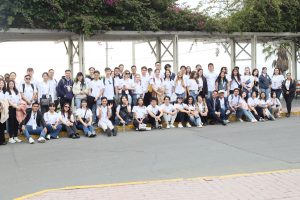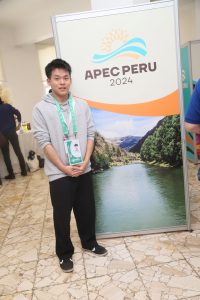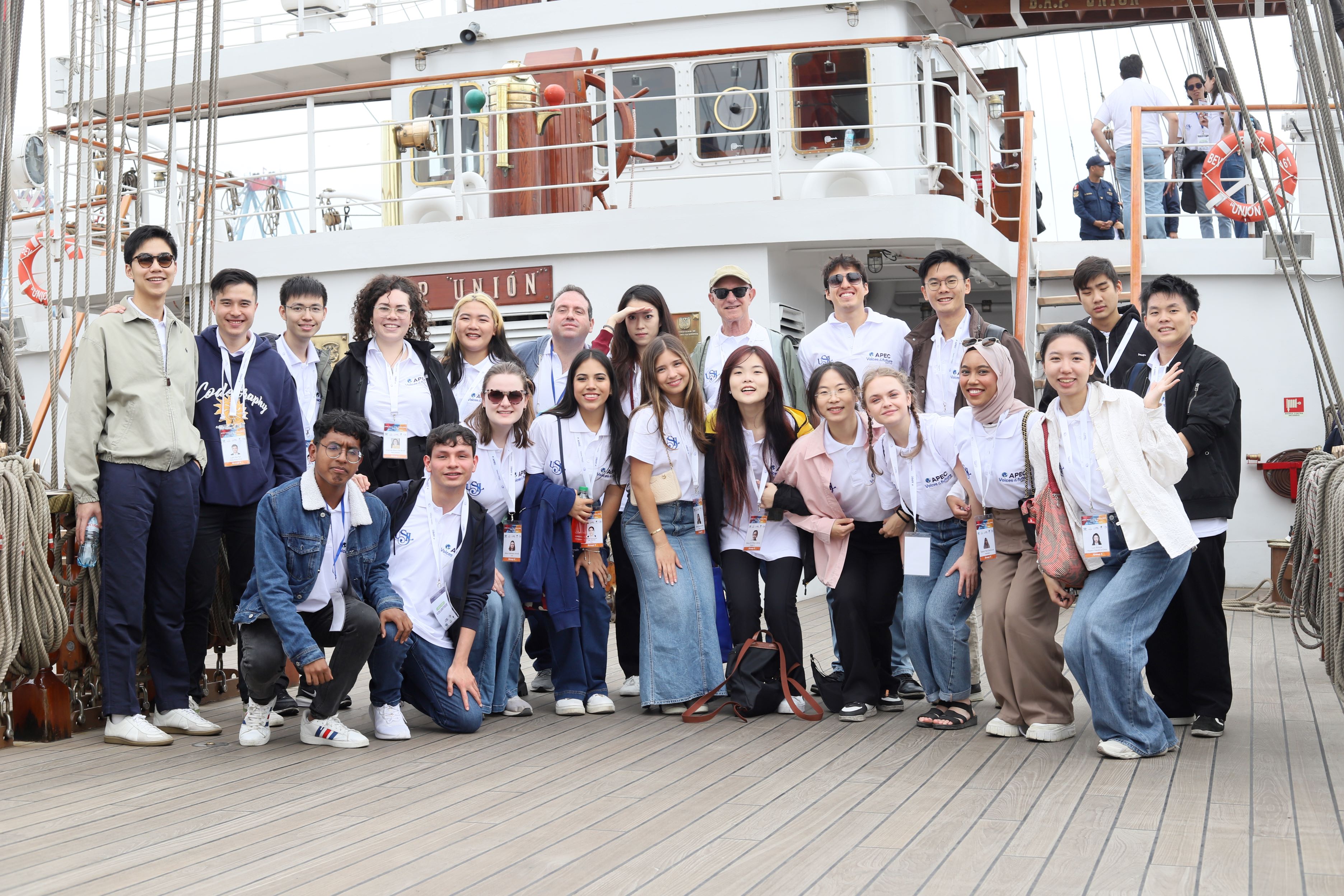
It was my honor to participate in the APEC Voices of the Future (APEC VOF) with 80 young people from 15 economies in Peru from November 10 to November 15. It was an unforgettable experience and memory for me to have the opportunity to listen to current leaders and build strong relationships with future leaders from APEC economies in Peru, a country with warm people and diverse cultures.
What is the APEC Voices of the Future?
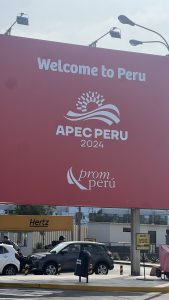 The APEC VOF is an initiative that brings together selected young leaders and educators from 21 APEC member economies for an annual gathering at the APEC Summit. The platform allows youth delegates to directly communicate their views on APEC’s vision and goals to key stakeholders such as APEC leaders, dignitaries, ABAC members, and even CEOs from the business community.
The APEC VOF is an initiative that brings together selected young leaders and educators from 21 APEC member economies for an annual gathering at the APEC Summit. The platform allows youth delegates to directly communicate their views on APEC’s vision and goals to key stakeholders such as APEC leaders, dignitaries, ABAC members, and even CEOs from the business community.
The theme of the APEC VOF follows the actual APEC theme. This year’s theme was “Empower, Include, Grow.” APEC stands for “Asia-Pacific Economic Cooperation,” and as the term implies, it also discussed the topic from the perspective of economic cooperation.
The APEC VOF is based on the philosophy that youth can provide new perspectives and insights into the APEC process, and it is a forum for promoting potential partnerships and cooperation for regional development. The program’s first half included drafting and discussing the Joint Declaration as the APEC VOF. In contrast, the second half of the program included opportunities to participate in all programs of the APEC CEO Summit.
Presentation and Joint Declaration at APEC Voices of the Future
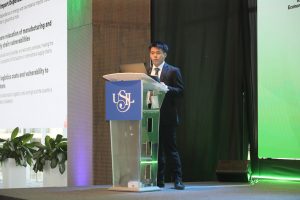
At the APEC VOF, all economies had the opportunity to give a presentation at the beginning of the program. There were differences in the themes that each economy focused on. For example, while some economies focused on culture, others focused on their own economic situation and challenges, while others reflected their policies in the APEC framework.
I first noted the challenges facing the Japanese economy, such as an aging society and high dependence on energy, and the resulting supply chain vulnerabilities. Next, I mentioned the importance of rulemaking and supply chain diversification through the CPTPP and strengthening relations with the Asia-Pacific region as Japan’s strategy to address these issues. I further stated that although APEC is a forum focused on the economic agenda, political matters should also be discussed from the perspective of geopolitics and geoeconomics. In promoting economic cooperation, I stressed that regional security and geopolitical trends cannot be ignored and that comprehensive discussions that include these issues are necessary. Finally, I emphasized the younger generation’s importance in pursuing sustainable economic growth and stability through cooperation for peace and coexistence.
A Joint Declaration was issued at the APEC VOF. The Declaration was developed with the agreement of representatives from all participating economies. APEC’s approach is characterized by voluntary, non-binding, and consensus-based cooperation. The drafting process of the Joint Declaration also required the agreement of all economies on all arrangements by a show of hands. Therefore, there were times when discussions did not proceed due to differences in detailed word choice and thinking. I believe that this would be a situation that would be even more confrontational at an actual international conference.
Looking back on it later, I thought that many of the contents were youth-led and aimed at solving social issues from the bottom up. In particular, there were many recommendations to create frameworks and platforms. For example, the ABAC report emphasizes strengthening and leveraging existing frameworks and agreements. On the other hand, the APEC VOF declaration often called for new frameworks from new perspectives unique to youth. Below are the conclusions of the Joint Declaration.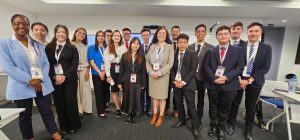
We, the youth of APEC, envision an empowered, inclusive, and growth-focused Asia-Pacific where every individual and community can thrive. Our call to APEC Leaders is to enact policies that uplift vulnerable communities, foster inclusivity, and drive sustainable development across the region. With unity and shared commitment, we can build a future where all voices are empowered, social and economic opportunities are inclusive, and all growth is sustainable.
Participating in the APEC CEO Summit
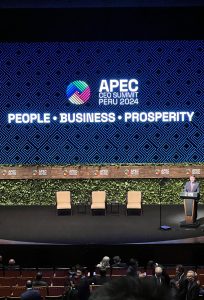 The APEC CEO Summit is an annual event that brings together leaders of APEC member economies and CEOs of global companies to discuss critical issues such as regional economic cooperation, trade and investment promotion, innovation, and sustainability. The APEC VOF participants were able to attend the Summit without any restrictions.
The APEC CEO Summit is an annual event that brings together leaders of APEC member economies and CEOs of global companies to discuss critical issues such as regional economic cooperation, trade and investment promotion, innovation, and sustainability. The APEC VOF participants were able to attend the Summit without any restrictions.
The CEO summit aims to deepen dialogue between policymakers and the private sector, strengthen public-private partnerships, and create sustainable economic growth and business opportunities. This year, the event was held at the theater and featured speeches and symposiums inside the theater by heads of state and business leaders from various economies. In addition, a networking space was set up outside the theater to network among business professionals. Participants from Japan belonged to companies with branch offices in Peru and South America.
Leaders from each economy talked about their economy’s efforts in APEC and the business attractions of their economy. On the other hand, panelists from the business community discussed the current global situation from a business perspective and its opportunities and risks. I was particularly impressed by the fact that every panelist mentioned geopolitical developments and risks. The recent uncertainties in the trade regime and geopolitical changes significantly impact the economy, politics, and security, and these risks are a challenge for each economy and business. In particular, the risks posed by weak supply chains, cross-border movement of resources, and disparities in AI and digital technologies were highlighted. I realized more keenly than ever the importance of international cooperation and rule-based order in recent affairs.
In the discussion on APEC, maintaining its attractiveness as an organization and coordinating the diverse voices among member economies were cited as important themes. In particular, the importance of incorporating youth perspectives into policy formation and addressing the challenges faced by the next generation was emphasized. APEC is not just a summit but a comprehensive and workable vision that must be realized through concrete policies. In doing so, it is important to back up policies with data, and it was pointed out that evidence-based discussions and decision-making are key to supporting inclusiveness and sustainability. I also reaffirmed APEC’s role in the economic integration of member economies and regional stability and the need for a new strategy to ensure long-term sustainability.
About Peru
 We received a warm welcome from the people of Peru. When most people think of Peru, Machu Picchu and alpacas may come to mind, but Peru has a very diverse culture. Peru has a coastal area, including Lima, a highland area represented by the Andes Mountains, and a tropical rainforest area represented by the Amazon, and each region has different cultural characteristics.
We received a warm welcome from the people of Peru. When most people think of Peru, Machu Picchu and alpacas may come to mind, but Peru has a very diverse culture. Peru has a coastal area, including Lima, a highland area represented by the Andes Mountains, and a tropical rainforest area represented by the Amazon, and each region has different cultural characteristics.
Peru is also characterized by nearly 50 ethnic groups, with each ethnic group having a different culture. In addition, the food culture is similar to that of East Asia, influenced by Japanese and Chinese immigrants. In particular, the ceviche made with raw tuna was excellent. I have visited more than ten countries so far, but Peru ranks among the top and is one of the places I would like to return to.
My situation
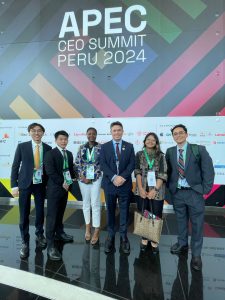
I was the only one representing Japan at the APEC VOF, which was different from the delegations of other economies. I had no educators, while all the other economies had educators; every economy sent at least two members.
However, this situation was not a weakness for me but rather a strength. I could freely interact with people from various economies without feeling any restrictions. In addition, people around me who knew I was attending alone actively welcomed me into their groups. One day, I ate dinner at the table of the Taiwanese delegation, and another day, I enjoyed having lunch at the table of the New Zealand delegation.
Most of all, I received a warm welcome and courteous guidance from the delegation of Peru, my “brothers.” I appreciate their generosity more than I can say.
Last Comment

The host economy for next year’s APEC is the Republic of Korea. I have visited Gyeongju before and found the city to be wonderful, full of rich history in an idyllic setting. I sincerely hope that next year’s APEC VOF will once again be a success.
(Some content differs from the Japanese version because the text has been restructured for English speakers.)
